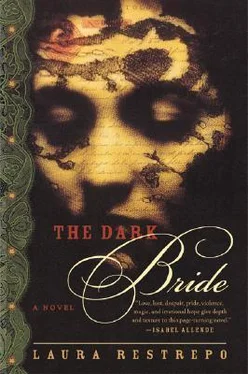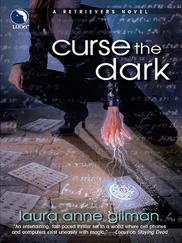“You know very well…”
“Tell me…”
“For a girl, who, before she left him for someone else, was called Sayonara. It is said that he who waits loses hope, but that’s not the case with him. His seems to be a hope goaded on week after week by an infinite patience. Every time they tell him you got married in a church, wearing a white veil, he says the commitment you have with him is before and above any other.”
Fearing the displeasure of the lady of the house, who was wary of strangers and suspicious of any words whispered behind her back, Amanda hurriedly said good-bye to Machuca, acting as if she hadn’t listened to her. But she had. She gathered up her confidence, folded it over twice with great tenderness as if it were a fine linen handkerchief, carefully put it away hidden against her heart, clinging to it to stay alive during those times of transit through the lands of nothingness.
“Where are you, Payanés, who is kissing you…? If not me, who is embracing you…?” She gave in to a sighing that was half killing her, half reviving her. “Don’t force me to bear so much unfulfilled desire gnawing at my heart…”
I have in my hand a small testament of what happened in those days of languishing sadness. It is a note hastily written in pencil by Machuca to Todos los Santos, three or four days after her encounter with Sayonara. Months afterward, they would make peace and everything would go back to the way it had been before, but due to some yes-it-is-no-it-isn’t, the friendship between Machuca and Todos los Santos had frayed during the period following the strike, marked in all of La Catunga by reticence, arguments, and strained nerves. So, even though they had stopped speaking, Machuca wanted to alert her old friend about Sayonara, whom she had seen surrendered to an unhealthy resignation. After a formal salutation, she wrote: “Several days ago I chanced upon your adopted daughter, who, as you may know through news from other sources, resides with her husband in Villa de la Virgen del Amparo, in this same departamento of Santander. I found her in good health and free of material contingencies, but I regret to inform you, comadre, that something must be done, because there is nearly nothing left of our girl’s former happiness.” Underneath, in black ink and in Todos los Santos’s handwriting, appears a kind of reply, jotted down after she’d read the letter, and directed at no one in particular: “Nothing can be done. We must simply wait until life, which once brought her here, brings her back again.”
We are going through strange days, with little talk and even less understanding, due to the bad taste provoked in Sacramento and the old ladies by the constant recollection of events subsequent to the wedding. My questions have stirred up bitter memories and now I can’t find a way to penetrate the wells of silence inside of which Sacramento drowns in feelings of guilt, Olguita in tears, and Todos los Santos in recriminations. And as if that weren’t enough, winter, or glass weather, as the fishermen on the Magdalena call it, has made the temperature drop in Tora by a few degrees, and the arrival of the cold — in reality a slight diminishment of the heat — has brought with it another inconvenience, Todos los Santos’s lack of bladder control, which causes her to become soaked every now and then by the lukewarm moisture of her own urine. Too proud to let anyone know what has happened, she keeps rocking as usual in her chair on the patio, feeding her animals, or napping in her bed.
“Come on, mother. We’re going to change our clothes, because we’ve had another accident,” Sacramento says to her, delicately using the plural conjugations of the verbs and helping her to get up.
“You too, son?” she asks. “Has this foul weather weakened your kidneys too?”
We couldn’t drive away the cold from her with the hot water bottle or the foxtails that she makes us wrap around her throat, or the famous pink rabbit-skin slippers that she keeps on her feet night and day.
“Be still, there’s nothing to do,” she tells us, swatting away our attempts to care for her. “Let’s just wait for winter to go away and take the intemperance with it, and meanwhile we’ll swim in urine. Nothing else can be done.”
However, I think we have discovered a more or less effective way, if not of curing this small catastrophe, of at least anticipating it. Todos los Santos, taciturn and withdrawn, has begun every now and then to break the long silences that overwhelm our conversations with an explosive cascade of words which are sometimes scolding, sometimes advice or warning, but are most often simply nostalgic digression. The content varies, but the form, always torrential, alerts us, because her urinary incontinence, by some curious anatomical symbiosis, is usually preceded by verbal incontinence. In these circumstances she mentioned for the first time the episode that she refers to as the elephant. When the thing with the elephant happened… and she’s off and running.
“Seen from above, all human life seems like a tangle of whims, becauses and for-no-reasons, and only by intense scrutiny and through searching for its meaning over the long term do you begin to find a pattern. Even those who are most caught up in the foolishness are clear about their motives for doing what they do, and there is no chance occurrence that isn’t, in and of itself, a known result,” she began saying a little while ago, as the rest of us rushed to place a basin under her skirts. “Forget about the basin and grab your notebook so you can write,” she ordered me, “because today I feel the need to talk.”
“Keep talking,” I say, “keep talking, I’m recording it in my memory. What were you saying about motives?”
“At night, we old people go to bed not to sleep, but to brood and ponder, and this morning, almost as the alarm began to ring, I realized clearly why Sayonara had married. She was trying to recover her name.”
“What are you saying?”
“The name that you carry is the sign of the life you have lived, and if you want to change your life, you must begin by changing your name. Sayonara had to go back to being Amanda to be able to make her visit…”
“What visit? To whom?”
“To her father, who was still alive, and even today the news of his demise hasn’t reached us here. You cannot go before your father saying that you have buried the family name that he has conferred on you and that you also changed your baptismal name for another that sounded prettier. That is in poor taste. Amanda must have imagined, speculating about the eventuality, that when she saw her father again and he asked her: ‘What have you done with your life, daughter?’ she would be able to look him in the eyes and say to him, without lying too much: ‘I got married, Father; I am a married woman who has fulfilled her duty to take care of her sisters and teach them by good example.’ However, being Sayonara, she would have cast her eyes on the ground, ashamed, silent, in such a way that her father would become suspicious.”
“Around here few adversities are as feared as parental rage,” interposes Sacramento, “and much is done to prevent it. Or to pacify it, if it has already been unleashed.”
“So how did Sayonara know where to look for her father?” I ask them.
“She had been making inquiries for some time,” replies Sacramento, “and she knew exactly where he was.”
Her source of information was a gentleman named Alfredo Molano, a wanderer by profession and very up-to-date on news about rambling and ramblers, who was known to have brought the news that Abelardo Monteverde, her father, was working as a merchant selling a variety of goods in the town of Sasaima, that he was still married to the same white woman, had educated her children, who were now grown, and was raising the new brood of little ones that they had had together. With that information in hand, Amanda took it into her head to go and find him.
Читать дальше












